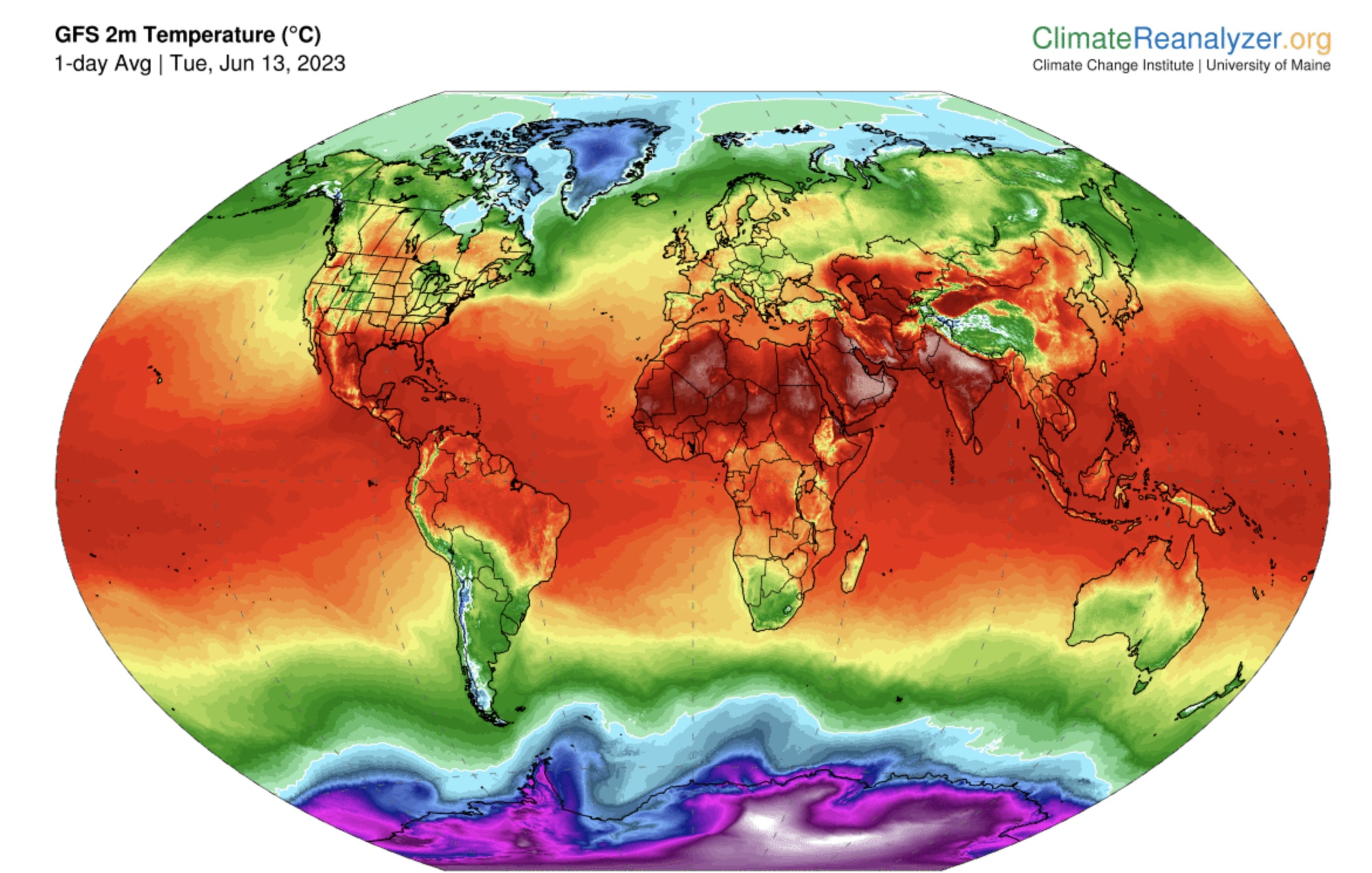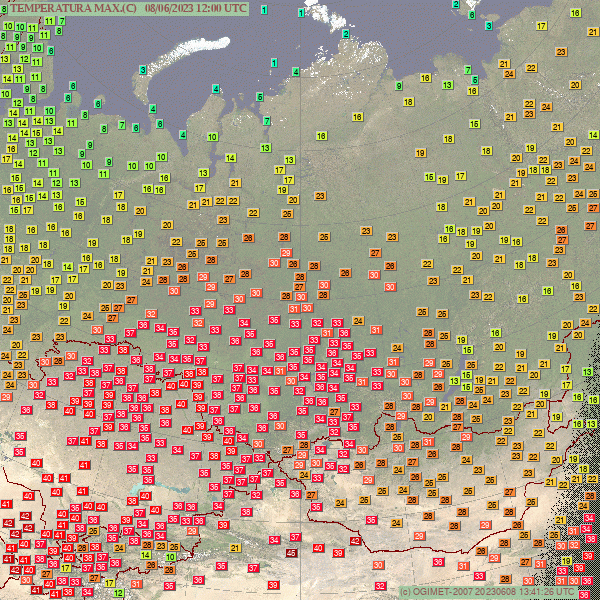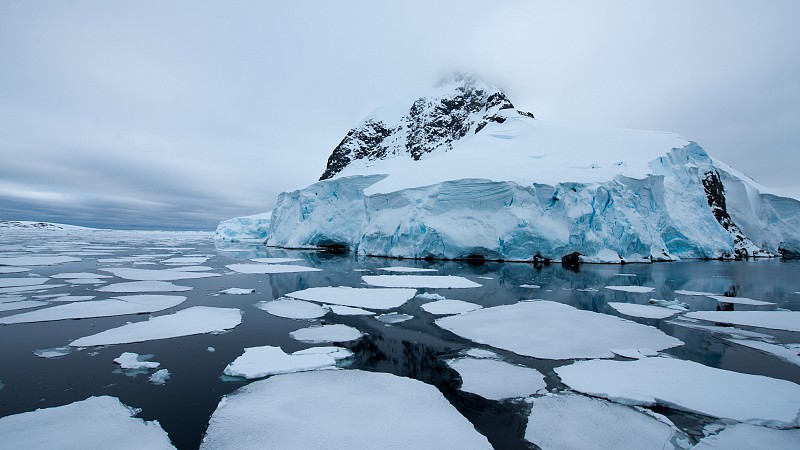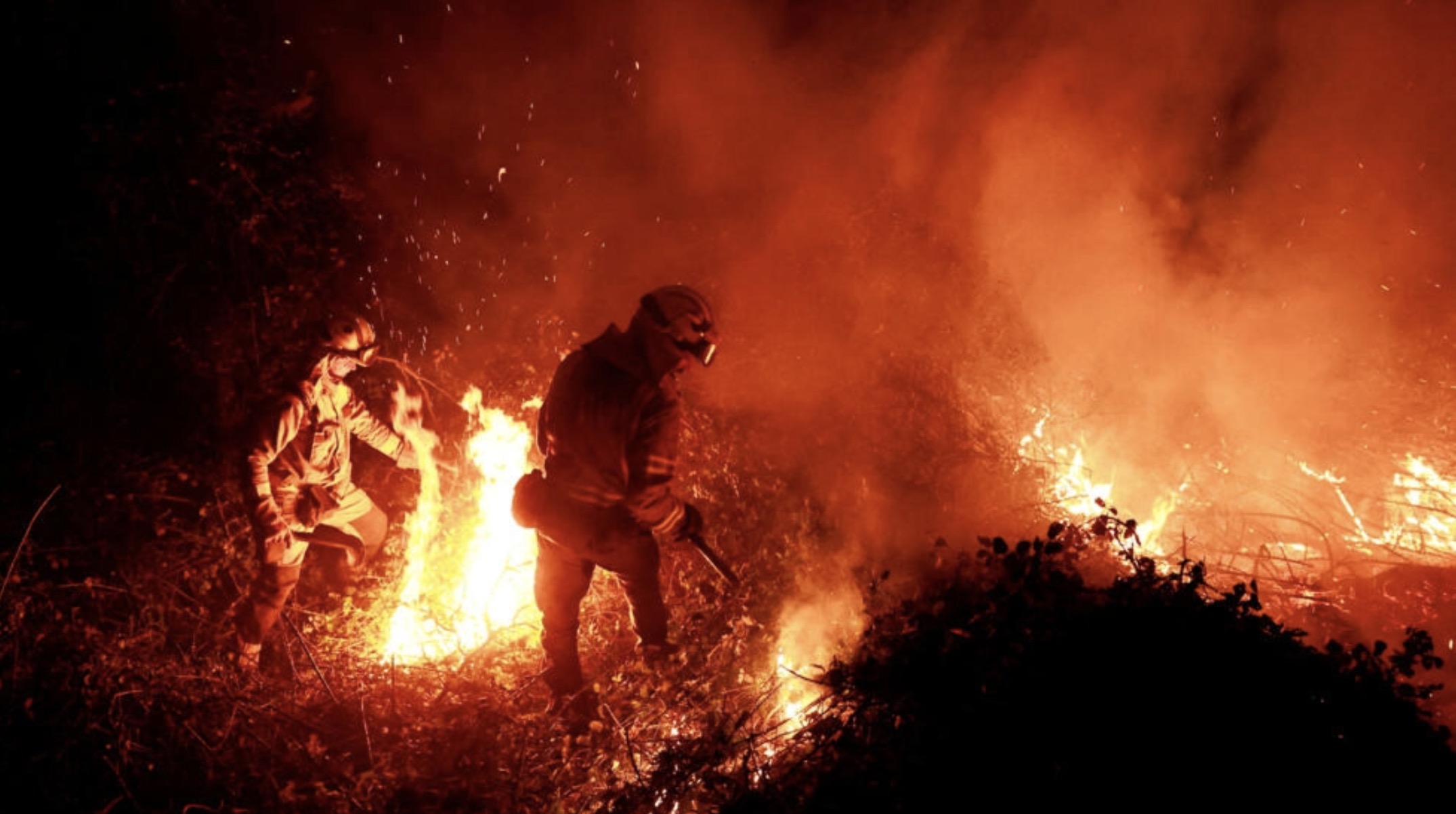
A temperature anomaly map of the world showing warmer than usual temperatures, June 13, 2023. /ClimateReanalyzer.org
A temperature anomaly map of the world showing warmer than usual temperatures, June 13, 2023. /ClimateReanalyzer.org
After 2022 witnessed a series of tragedies caused by heatwaves, scientist say extreme weather is hitting new highs and rewriting climatic history in 2023.
Climate change caused by humans increased the risk of drought five- or six-fold in 2022, a year when forest fires ravaged twice as much territory as in recent years, the European Economic Area (EEA) said.
The summer of 2022 also saw more deaths than usual in Europe following repeated heatwaves, and there were 53,000 more deaths in July 2022 than the monthly average in 2016 to 2019 period.

A graphic which shows temperatures worldwide posted by climatologist Maximiliano Herrera on Twitter, June 8, 2023.
A graphic which shows temperatures worldwide posted by climatologist Maximiliano Herrera on Twitter, June 8, 2023.
Siberia swelters in 'worst heatwave in history'
According to the climatologist Maximiliano Herrera who tracks extreme temperatures across the globe, dozens of heat records have broken in Siberia as temperatures hit 37.9 degrees Celsius in Jalturovosk, its hottest day in history, on June 3.
Several other heatwave records were broken on that day as well – Baevo hit 39.6 degrees Celsius while Barnaul saw 38.5 degrees Celsius.
"So we can say it's really exceptional." It's the region's "worst heatwave in history," the climatologist posted on Twitter on June 7.
"Records keep falling today with again temperatures around 40 degrees Celsius," Herrera said the second day, and pointed out that it looks set to get even worse.
It's not just Siberia that saw record heat, but also Central Asia. In early April, Turkmenistan saw temperatures of 42 degrees Celsius, which was "a world record for that latitude," Herrera said.
Temperatures of more than 45 degrees Celsius were recorded in China, 43 degrees Celsius in Uzbekistan and 41 degrees Celsius in Kazakhstan.
It's "a historic heat wave, which is rewriting world climatic history," said Herrera on Twitter.

A view of iceberg in the Antarctic. /CFP
A view of iceberg in the Antarctic. /CFP
Antarctica's coldest, saltiest ocean waters heating up
Deep ocean water in the Antarctic region is heating up, with potentially far-reaching consequences for climate change and deep ocean ecosystems, according to a study published Monday by the British Antarctic Survey
The study said "Antarctic bottom water" is the coldest, saltiest water on the planet. These waters, which play a crucial role in the ocean's ability to act as a buffer against climate change by absorbing excess heat and human-caused carbon pollution, also circulate nutrients across the ocean.
But in the Weddell Sea, located east of the Antarctic Peninsula, this vital water mass is in decline, due to long-term changes in winds and sea ice, said the study.
"Some of these sections were first visited as far back as 1989, making them some of the most comprehensively sampled regions in the Weddell Sea," Povl Abrahamsen, a physical oceanographer at BAS and co-author, said in a statement.
They found that the volume of the cold bottom waters has shrunk by more than 20 percent over the past three decades, and ocean waters deeper than 2,000 meters have warmed four times faster than the rest of the global ocean.
The reason these deep waters are shrinking is down to changes in sea ice formation caused by weakening winds, according to the study.
In a March study, scientists found that melting ice is diluting the saltiness of the ocean and slowing down the the circulation of deep ocean water in the Antarctic.
The study also found that failure to limit planet-heating pollution could lead to the collapse of the circulation of deep ocean water, with potentially devastating consequences for the climate and marine life.
Shenjie Zhou, an oceanographer at BAS and lead author of the study, said the new study is "an early warning," as "the ongoing changes in the deep water layer in the Antarctic are already happening and it's not heading in the direction that we want."

Galician firefighters tackle flames in a forest during an outbreak of wildfires following a prolonged period of drought and unusually high temperatures, Piedrafita, Asturias, Spain, March 31, 2023. /Reuters
Galician firefighters tackle flames in a forest during an outbreak of wildfires following a prolonged period of drought and unusually high temperatures, Piedrafita, Asturias, Spain, March 31, 2023. /Reuters
195,000 killed in Europe since 1980
Extreme weather conditions in Europe have killed almost 195,000 people and caused economic losses of more than 560 billion euros ($605 billion) since 1980, the European Environment Agency said Wednesday.
Of the total losses, only 170 billion, or 30 percent, were insured, the EEA said, as it launched a new online portal collating recent data on the impact of extreme weather.
"To prevent further losses, we need to urgently move from responding to extreme weather events ... to proactively preparing for them," said EEA expert Aleksandra Kazmierczak.
According to the latest data, heatwaves accounted for 81 percent of deaths and 15 percent of financial losses.
Europe needs to take measures to protect its ageing population, with the elderly particularly sensitive to extreme heat, the EEA said.
"Most national adaptation policies and health strategies recognize the impacts of heat on cardiovascular and respiratory systems. But less than half cover direct impacts of heat like dehydration or heat stroke," it said.
The summer of 2022 saw more deaths than usual in Europe following repeated heatwaves, but the 2022 deaths were not included in the data published on Wednesday.
There were 53,000 more deaths in July 2022 than the monthly average in 2016-2019, up by 16 percent, though not all of those deaths were directly attributed to the heat, the EEA said.
Spain registered more than 4,600 deaths linked to the extreme heat in June, July and August.
Climate modelling has predicted longer, more intense and more frequent heatwaves.
In February 2022, the EAA said extreme weather killed 142,000 people and caused 510 billion euros in losses for the period 1980-2020.
The increase in the figures released on Wednesday was partly due to the fact that in 2021, flooding in Germany and Belgium led to economic losses of almost 50 billion euros.
In terms of deaths, a change in methodology in France and Germany was responsible for the large variation, the EEA said.
'Devastating consequences'
Climate change caused by humans increased the risk of drought five- or six-fold in 2022, a year when forest fires ravaged twice as much territory as in recent years, the EEA said.
Droughts could end up being very costly.
Economic losses could rise from 9 billion euros per year to 25 billion euros at the end of the century if the planet warms by 1.5 degree Celsius.
That could climb to 31 billion euros if it warms by 2 degree Celsius and 45 billion euros if it warms by 3 degree Celsius, according to scientific scenarios.
The consequences for agriculture could be "devastating," the EEA warned.
"Farmers can limit adverse impacts of rising temperature and droughts by adapting crop varieties, changing sowing dates and with changed irrigation patterns," the report said.
Without changes, yields and farm incomes are projected to decline in the future, it said.
While human losses from flooding are much lower, accounting for just 2 percent of the total, they are the most costly, accounting for 56 percent of economic losses.
(With input from AFP)